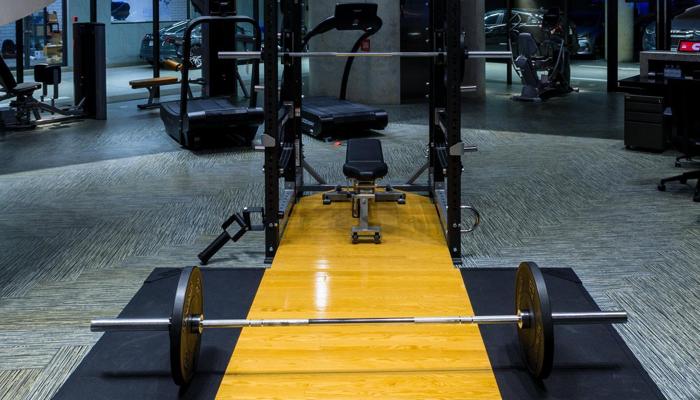Unlock the transformative power of strength training! Discover its benefits for your health, from metabolism to mental resilience. Read more
In the bustling landscape of the Indian fitness scene, where
yoga, running, and Bollywood dance workouts often take center stage, there's a workout modality that many often overlook – strength training.
Now, before you conjure images of bulky bodybuilders grunting under heavy weights, let's clarify what we mean by strength training. It's simply any exercise that makes your muscles work against resistance.
This could involve using weights (dumbbells, barbells, kettlebells), resistance bands, or even just your own body weight (think push-ups, squats, lunges).
Why should you, the average Indian, sitting at home, working from home, or juggling a family and a career, consider adding strength training to your routine? The answer, as you'll discover, is multifaceted and incredibly compelling.
Strength training boosts metabolism, aids weight management, muscle preservation, and bone density
First and foremost, strength training is a fantastic way to boost your metabolism. Imagine your body as a furnace burning calories. Muscle tissue is more metabolically active than fat tissue, meaning it burns more calories even when you're at rest.

By building muscle through strength training, you essentially increase the size of your furnace, leading to a higher resting metabolic rate. This translates to burning more calories throughout the day, even when you're not actively exercising.
For those aiming to manage their weight or shed a few extra kilos, strength training is an invaluable tool. Moreover, as we age, we naturally lose muscle mass (a process called sarcopenia). This loss can lead to decreased strength, mobility, and an increased risk of falls and injuries.
Strength training helps combat sarcopenia by preserving and even building muscle mass, allowing you to maintain your independence and quality of life as you get older. Besides weight management and muscle preservation, strength training plays a pivotal role in improving bone density.
Weight-bearing exercises, like squats and lunges, put stress on your bones, signaling them to become stronger and denser. This is especially important for women, who are at a higher risk of developing osteoporosis (a condition characterized by weak and brittle bones) as they age.
Incorporating strength training into your routine can significantly reduce your risk of fractures and other bone-related problems. It's about building a resilient body that can withstand the test of time.
Strength training boosts physical and mental well-being long-term
Think of strength training as an investment in your overall well-being. It's not just about aesthetics; it's about building a stronger, healthier, and more resilient you.

You'll find yourself able to carry groceries with ease, play with your children or grandchildren without getting winded, and maintain your independence for years to come. The improved bone density also contributes to better posture and reduced back pain.
Modern life often involves prolonged periods of sitting, which can lead to muscle imbalances and poor posture. Strength training can help correct these imbalances by strengthening the muscles that support your spine and promoting proper alignment.
Furthermore, strength training has a positive impact on your mental health. Exercise, in general, is known to release endorphins, which have mood-boosting effects. But strength training, in particular, has been shown to reduce symptoms of anxiety and depression.
The sense of accomplishment you feel after completing a challenging workout, the visible progress you see in your strength and physique, and the increased confidence that comes with feeling stronger and more capable can all contribute to a more positive outlook on life.
It is about enhancing mental resilience.
Strength train at home with basic exercises; start gradually, seek guidance if needed
Now, you might be thinking, "But I don't have time to go to a gym!" That's perfectly understandable. The good news is that you don't need a fancy gym membership to reap the benefits of strength training. Many effective exercises can be done at home with minimal equipment.

Bodyweight exercises like squats, push-ups, lunges, planks, and dips are a great starting point. As you get stronger, you can gradually increase the difficulty by adding resistance bands or dumbbells.
There are also plenty of online resources, including videos and articles, that can guide you through proper form and technique. It's important to start slowly and gradually increase the intensity and duration of your workouts as you get fitter. And remember, consistency is key.
Even short, regular bursts of strength training can make a significant difference in your overall health and well-being. It's about finding what works for you and making it a sustainable part of your lifestyle.
Furthermore, consulting with a qualified fitness professional can be beneficial, especially if you have any underlying health conditions or are new to strength training.
A trainer can help you develop a personalized workout plan, teach you proper form, and ensure that you're exercising safely and effectively.
Strength training for women builds tone, not bulk; benefits all fitness routines
Many Indians, particularly women, may harbour concerns that strength training will make them "bulky." This is a common misconception. Building significant muscle mass requires a specific diet, training regimen, and often, genetic predisposition.
For most people, strength training will result in a more toned and defined physique, rather than excessive bulk. It's about shaping and sculpting your body, rather than transforming it into something unrecognizable. Moreover, strength training can complement other forms of exercise.
If you enjoy running or yoga, incorporating strength training into your routine can improve your performance and reduce your risk of injury. Stronger muscles can help you run faster and longer, and improved core strength can enhance your balance and stability during yoga poses.
It's about creating a well-rounded fitness program that addresses all aspects of your physical health. You can incorporate strength training in a variety of ways into your routine. The key is to find something that you enjoy and that fits into your lifestyle.
It's about making fitness a fun and rewarding experience.
Strength training benefits everyone for overall health and fitness
In conclusion, strength training is not just for bodybuilders or athletes; it's for everyone. It's an essential component of a well-rounded fitness routine that offers a multitude of benefits for people of all ages and fitness levels.

From boosting your metabolism and preserving muscle mass to improving bone density and enhancing your mental health, strength training is an investment in your long-term health and well-being.
So, ditch the misconceptions, embrace the challenge, and discover the transformative power of strength training. You might be surprised at how much stronger, healthier, and more confident you become. It's about achieving overall good health and fitness.
Strength train at home using everyday items, not just weights
There are also alternative ways, you do not need to lift heavy weights to consider strength-training. You can use everyday items in your home as alternative weights. You can use 2-5 litre water bottles or milk packets as makeshift dumbells.

You can start with something easy like push-ups, which can be done on the floor or at an incline. You can also do squats, which requires no equipment.




















